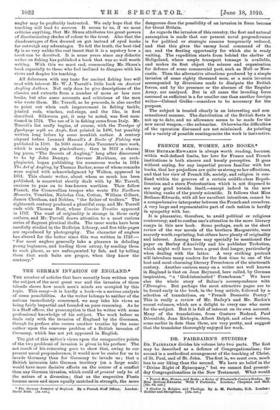THE GERMAN INVASION OF ENGLAND.* THE number of articles that
have recently been written upon the subject of the next great war and the invasion of these islands shows how much men's minds are occupied by this topic. This essay—it is hardly a book—is a serious analysis of some possibilities. As the writer belongs to neither of the nations immediately concerned, we may take his views as being fairly impartial and founded on pure reasoning. As be is a Staff officer, the presumption is that he writes with some professional knowledge of his subject. The work before us deals only with the invasion of England by the Germans, though its preface also covers another treatise by the same author •upon the converse problem of a British invasion of Germany, which has not yet appeared in English.
The gist of this writers views upon the comparative points of the twa problems of invasion is given in his prefa,ci: The net resultof his reasoning goes to show that, owing to our present naval preponderance, it would now be easier for us to invade Germany than for. Germany to invade us.; that a British incursion into German territory (on a large scale) would have More decisive effects on the course of a conflict than any German invasion, which could at preSent only be of the nature of a diversion ; that as the respective .Fleets became more and more equally matched in strength, the more
• The German -Insusion of England. By a French 13tatI Officer. London: David Nutt. [i.e. net.]
dangerous does the possibility of an invasion in force become for Great Britain.
As regards the invasion of this country, the first and natural assumption is made that our present naval preponderance is for political or strategic reasons temporarily reduced, and that this gives the enemy local command of the sea and the fleeting opportunity for which she is ready waiting. The expedition starts from behind the shelter of Heligoland, where ample transport tonnage is available, and makes its first object the seizure and organisation for defence of some commercial port, such as Hull or New- castle. Then the alternative situations produced by a simple invasion of some eighty thousand men, or a main invasion accompanied by diversions made to dissipate the British forces, and by the presence or the absence of the Regular Army, are analysed. But in all cases the invading force assumed as sufficient is a far smaller one than another foreign, writer—Colonel Glidke—considers to be necessary for the purpose.
The subject is treated clearly in an interesting and non sensational manner. The distribution of the British fleets is not up to date, and no allowance seems to be made for the new naval weapon,—the submarine. Otherwise the difficulties of the operation discussed are not minimised. As pointing out a variety of possible contingencies the work is instructive.










































 Previous page
Previous page